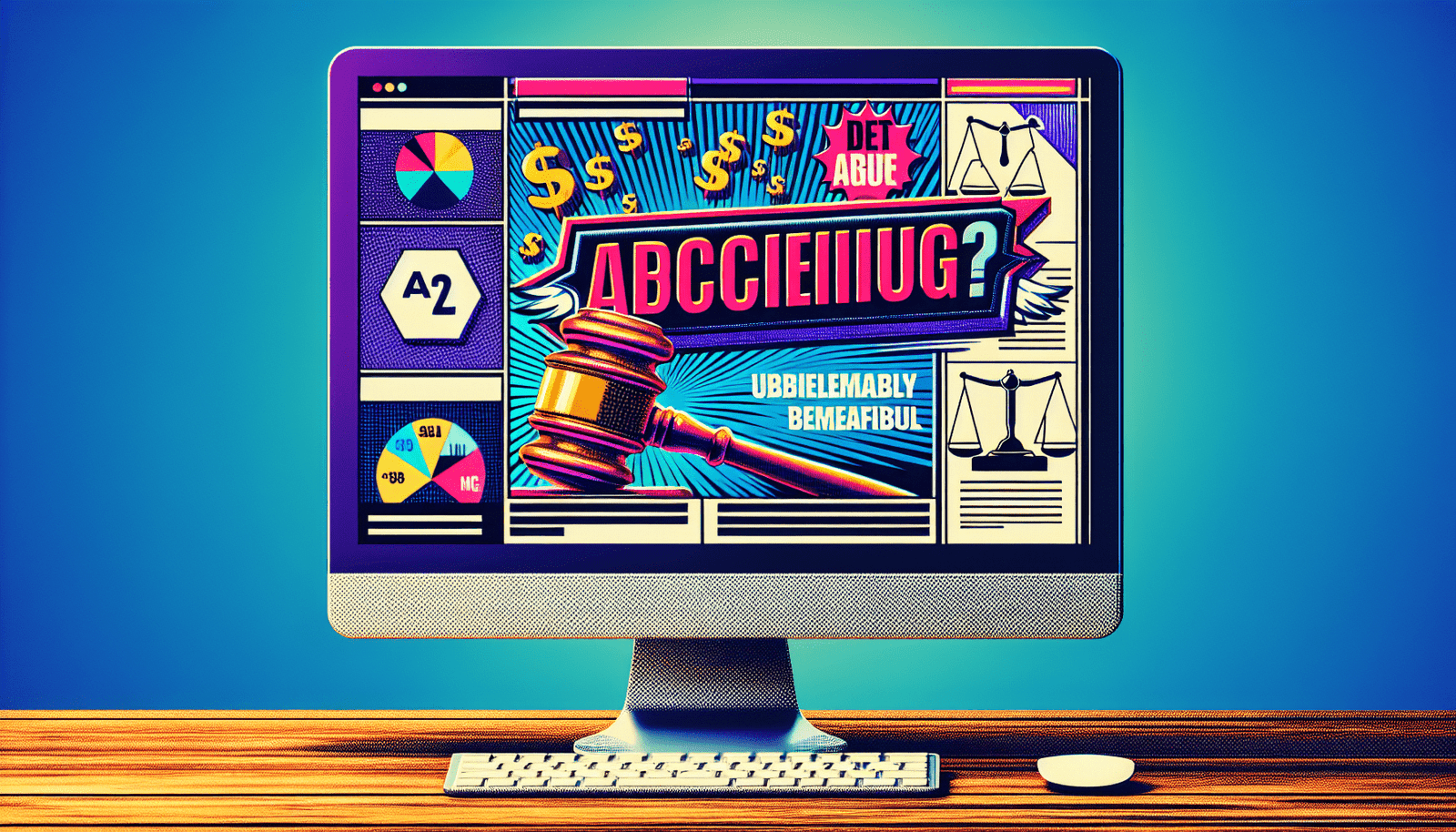I’m excited to dive into the fascinating world of “Examples of Misleading Online Advertising Lawsuits.” This article explores various high-profile cases where companies faced significant legal challenges due to their deceptive online advertisements. It’s a rollercoaster ride through the legal labyrinth, featuring infamous incidents like exaggerated product claims, hidden fees, and fake customer reviews. By examining these cases, I aim to shed light on the importance of truthful advertising and the legal repercussions companies face when they fail to uphold these standards. Join me on this journey as we unpack the complexities and legal battles of misleading online ads! Have you ever found yourself clicking on an enticing online ad, only to realize moments later that something about it felt a little… off? You’re not alone. Many of us have been lured into the web (pun entirely intended) of misleading online advertisements. But what happens when these deceptive ads go beyond frustrating consumers to triggering full-blown lawsuits? Let’s delve into some real-life examples that highlight the perils of misleading online advertising.
Examples of Misleading Online Advertising Lawsuits

The Infamous “Weight-Loss Gummies”
One of the most notorious cases involved a line of “weight-loss gummies” that promised significant weight reduction with minimal effort. It seemed almost too good to be true—because it was. The company claimed that users could shed pounds just by munching on their tasty gummies, with no need for exercise or dietary changes. Many customers, seduced by this easy solution, bought into the hype.
When the promised results failed to materialize, consumers began to question the legitimacy of these claims. Soon enough, the Federal Trade Commission (FTC) stepped in. They found the company’s advertisements to be misleading and unsupported by scientific evidence. The lawsuit ended with the company having to pay millions in settlements and fines. A classic example of how misleading health claims can backfire spectacularly.
The Subscription Trap
Let’s chat about the classic subscription trap. Picture this: you sign up for a “free trial” for a new streaming service. You’re excited, they have all the shows and movies you’re keen to binge-watch. But then, you start noticing strange charges on your credit card. What happened to your free trial?
Turns out, many companies exploit this tactic to lure users with the promise of a free trial that seamlessly rolls into a paid subscription without clear, upfront disclosure. These auto-renewals without proper consent have led to numerous lawsuits. One prominent case involved a fitness app that offered a “14-day free trial” but failed to clearly inform users that they’d be charged a hefty fee after the trial period ended. This resulted in a class-action lawsuit where affected consumers banded together to fight back.
Pro tip for consumers:
Always read the fine print and set reminders to cancel any trials you sign up for to avoid unexpected charges. And companies? Put your terms in plain sight—transparency builds trust.
The Case of the Disappearing Discount
Have you ever rushed to an online sale, only to find that the amazing deal you’d been promised mysteriously disappeared at checkout? This isn’t just infuriating; it can also be illegal.
Take for example a major electronics retailer caught in a deceptive pricing scheme. They advertised significant discounts on high-ticket items, but when customers went to finalize their purchases, the discounts evaporated due to hidden costs or unmentioned exclusions. This bait-and-switch tactic landed the retailer in hot water with the FTC. They had to rectify their pricing practices and pay sizable fines. So, remember, transparency in pricing is just as crucial as the product quality itself.
Influencer Endorsements: Trust or Bust?
In today’s digital age, influencers wield tremendous power. However, with great power comes, well, great potential for lawsuits. Influencer endorsements, especially when they aren’t transparently disclosed as paid promotions, can lead to massive legal issues.
One notable incident involved a famous beauty influencer who raved about a skincare product on her social media platforms. Thousands of followers purchased the product based on her glowing review. However, it was later revealed that she had been paid a substantial sum to endorse the product—without disclosing this fact to her followers. Misleading advertising? The FTC thought so, resulting in penalties for both the influencer and the brand.
Misleading “Eco-Friendly” Claims
Today’s consumers are incredibly environmentally conscious, making “eco-friendly” tags on products immensely appealing. However, these claims can often be a smokescreen, masking thoroughly non-eco-friendly practices.
Consider the case of a major apparel company that launched a “sustainable” clothing line. The advertising claimed the products were made from recycled materials and environmentally friendly processes. However, an investigative report found that the “recycled” materials were minimal, and the production processes were anything but green. This greenwashing, or making deceptive claims about a company’s environmental practices, led to a lawsuit where the company was forced to clarify its advertising and make a substantial donation to environmental causes. As a pro tip, always look for certifications from recognized environmental organizations when buying green.

The Hidden Fees Scandal
We all despise hidden fees. Unfortunately, they’re more common than you might think. Many online companies lure customers in with seemingly low prices, only to pile on unexpected fees at the confirmation stage.
A classic example involves a well-known airline that advertised incredibly cheap flights. However, the actual cost was significantly higher due to a plethora of undisclosed fees for everything from checked baggage to seat selection. This led to numerous complaints and eventually a lawsuit accusing the airline of deceptive advertising practices. Result? The airline had to revise its advertising to include all fees upfront and pay hefty fines. This case is a stark reminder that transparency in all aspects, especially pricing, is non-negotiable.
The Miracle Supplements
Ah, the wild world of dietary supplements. Many companies have landed in hot water over exaggerated claims about their miracle pills and potions.
One notable lawsuit involved a company that claimed its supplements could reverse aging, increase energy levels, and even cure serious illnesses. The catch? None of these claims were backed by scientific evidence. The FTC sued the company for making unfounded health claims and misleading consumers. The settlement required the company to cease its misleading advertisements and provide refunds to affected customers. Lesson learned for supplement companies: scientific evidence isn’t optional.
Hidden Terms in Financial Services
Financial service ads are not immune to misleading practices either. Many of us have been lured by promises of “low interest rates” or “no annual fees,” only to be later hit with hidden charges buried in the fine print.
A glaring example involved a credit card company that heavily advertised their “zero annual fee” card. However, customers soon found themselves charged with numerous hidden fees and high interest rates due to obscure terms and conditions. This resulted in a class-action lawsuit where affected consumers successfully argued that the company’s advertising was deceptive. The company had to pay settlements and revise its marketing strategies to be more transparent.
Software and “Lifetime” Licenses
Here’s a doozy—software companies often promote “lifetime” licenses at a premium cost. Sounds like a good deal, right? But what if the lifetime they refer to is their decision to stop updating or supporting the software?
One such instance involves a popular antivirus software company. They advertised a “lifetime” subscription, giving consumers the impression they’d receive regular updates and support indefinitely. However, a few years down the road, the company ceased updates and support, effectively rendering the software useless. This led to a major lawsuit, and the company was required to offer refunds or convert these “lifetime” licenses into term-based but supported ones. The moral? Lifetime should indeed mean lifetime.
The “Freebies” That Cost You
Who doesn’t love free stuff? Many companies offer freebies to attract customers. However, when these come with strings attached, they can lead to legal trouble.
An example involves a cosmetics company that offered a “free” sample of their latest anti-aging cream. Consumers merely had to cover the cost of shipping and handling. What followed, however, was a hidden subscription. Customers found themselves billed monthly for additional products they hadn’t explicitly agreed to. This misleading practice resulted in a lawsuit, with the company being ordered to refund affected customers and revise their marketing practices. Remember, “free” should not come with hidden strings.
Pro tip for businesses:
Be clear about any recurring costs associated with promotional offers. Consumers appreciate honesty, and it keeps you out of legal hot water.
False Scarcity
Ever rushed to buy something because the website said “Only a few items left”? These scarcity tactics are designed to create a sense of urgency. But when these claims are bogus, it can lead to significant issues.
A prominent online retailer learned this the hard way. They employed false scarcity tactics to boost sales during a holiday season, claiming limited stock to push purchases. However, it was later revealed that stock levels were nowhere near as low as advertised. Angry customers and regulatory bodies viewed this as deceptive, resulting in a costly lawsuit. Companies should remember that while scarcity can boost sales, honesty in marketing is always the safer bet.
Misleading “User Reviews”
We all rely on user reviews, right? They can make or break a product’s reputation. But what happens when these reviews are manipulated?
A popular electronics company faced this dilemma when they were caught posting fake positive reviews of their products and deleting negative ones. This blatant attempt to deceive potential buyers led to a lawsuit wherein the company had to not only stop these unethical practices but also pay hefty fines. More importantly, the incident severely damaged their reputation, proving that ethical marketing isn’t just about staying out of court—it’s about maintaining consumer trust.
The Fine Print Fiasco
Remember those terms and conditions we always skip reading? Sometimes, these hidden fine prints can lead to epic legal battles.
Consider the case of a travel booking website that advertised “no change fees” for flight bookings. Sounds fantastic until you realize that buried within pages of fine print were numerous exceptions and hidden costs. Many customers found themselves paying hefty fees when they had to make changes to their flights, leading to a class-action lawsuit against the company. The resolution? The company had to simplify their terms and make all costs clearly visible upfront.
Pro tip for consumers:
Always take a few extra moments to scan through the main terms and conditions. It could save you a lot of trouble.
Conclusion
Navigating the world of online advertising can be a bit like walking through a minefield. Misleading ads not only frustrate consumers but can also lead to massive legal repercussions for companies. Whether it’s exaggerated claims, hidden fees, or deceptive practices, the consequences of misleading online advertising are significant. It’s crucial for businesses to prioritize transparency and honesty in their advertising efforts.
For consumers, being aware and vigilant can protect you from falling prey to these tactics. And if something appears too good to be true, it probably is.
So, have you encountered any misleading ads lately? Share your experiences, and let’s continue to learn from these cautionary tales together.



